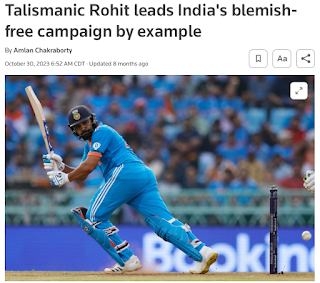Naturalization: Is Your Record As Blemish-Free as India Cricket?
 |
| Credit Reuters |
Happy days to the Indian national cricket team, taking its first grand title of a T20 World Cup. A nearly blemish-free record by most accounts. By the way, this year was also America's first serious ICC Cricket tournament on home turf. The U.S. team actually won enough games to qualify for the 2026 T20 World Cup in Sri Lanka and India!
This rather reminds me of U.S. immigration law.
This is because, in addition to the many requirements for U.S. naturalization, applicants must have what is called Good Moral Character (GMC). This can be a highly discretionary standard used as a catch-all for a derogatory past that may not be technically disqualifying. Some people think it only matters for the previous five years. This is not true. For clients without a blemish on their record, I don’t submit proof of GMC. For those that do, I work hard to prove this up. So what is considered a blemish?
This must be examined early in a client screening. Why?
It’s not just court convictions. Lack of GMC can be a mere criminal charge, or even an act without a charge that is referenced elsewhere in the application--like drug use in a chemical evaluation. It can even be a verbal admission to the interviewer!
Lack of GMC can go outside criminal acts, too, like failure to pay child support, philandering or drunkenness. A recent client was denied naturalization for excessive parking tickets! These are only a few examples--it’s critical to see a lawyer before any immigration application!
When there are “blemishes,” one must proactively demonstrate GMC. I’ve held up clients’ applications for months to acquire proof of GMC. And there are many ways to do this, but I focus here on what I think are most effective.
First, permanently stop whatever activity threatens GMC, and do not repeat it. Sober up, pay the child support, file overdue tax returns, pay back taxes, etc. In the case of crimes, HOWEVER, talk to a lawyer before doing anything! Paying a fine admits guilt and enters a conviction on your record, which may or may not hurt an immigration application. An experienced attorney might resolve the matter a better way. An absolutely DO NOT expunge or seal a record. Click here for why.
But that’s not enough. One must follow up with a proactive showing of Good Moral Character. One way is to document volunteer efforts in the community. To be really helpful, make sure the effort is for a 501(c)3 nonprofit. There are a myriad of organizations where one can do this, and most have a volunteer coordinator experienced in writing letters describing your service. Ideally a time log accompanies the letter. Ideally, there is no personal connection to the organization.
NOTE: Such letters should contain the following content:
1. Who—On company letterhead, the position of the letter writer in the organization, how they interacted with you, and their contact information.
2. What—What you specifically did for the organization.
3. When—Exact time periods you helped.
4. How Much—Quantity and also frequency of your time and donations.
So how many of these letters will help? It depends on the quantity and nature of the "blemishes." It comes down to this: Either submit as many letters as you can at the beginning of the application, or do so after the application is denied.
If you’re denied only on GMC grounds, depending on the record, one can often just apply again. Not necessarily, but often. But then you’ve delayed your citizenship and incurred extra cost only to start doing exactly what should’ve been done in the first place. And such evidence is less credible when beginning to volunteer after a denial, because it tends to indicate you're only do so for immigration purposes and not your character. I say this not out of theory, but real experience with clients who have hired me after denial.
There are additional ways to show GMC, but these are not substitutes for the above: gainful employment, dedicated homemaking, taking care of disabled family or friends, education, family ties, length of time in the US, good credit score. Again, these are not substitutes especially when offsetting a blemish on your record. Without a derogatory past, these things are nice to mention but are not necessary to prove up.
You can get more details about this issue in the USCIS Policy Manual regarding Good Moral Character. I would appreciate your feedback and questions!


Comments
Post a Comment